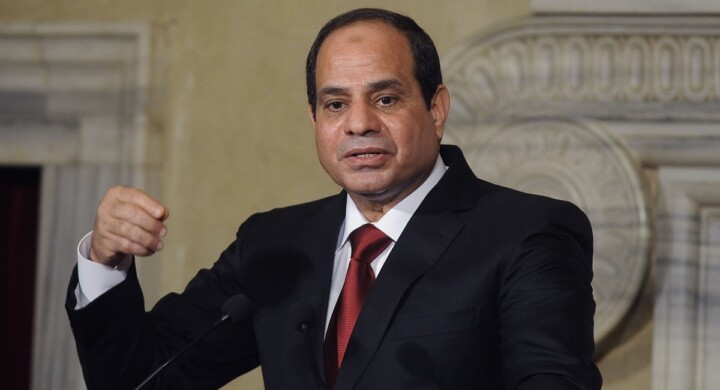The Egyptian president al Sisi exploited the conflict between Israel and Hamas to create diplomatic wiggle room and build his own international standing. But Alessia Melcangi, professor of Contemporary MENA History and non-resident fellow of the Atlantic Council, believes he also had internal reasons
Egypt has played a crucial role in reaching the ceasefire between Israel and Hamas, which came through after eleven days of war and dozens of broken lives. Yes, the United States asked Benjamin Netanyahu’s government to stop, and rather forcefully at that (and while the latter publicly shot down the idea, he did slow down the rate of the attacks on Gaza and eventually brought them to a halt). It is also true that Turkey’s President Recep Tayyip Erdoğan has tried to profit from the crisis by exploiting the Palestinian side to uphold its image of the global defender of Muslims. Cairo, however, took on a key role – unsurprisingly.
That ceasefire allowed President Abdel Fattah al-Sisi to add another success to the strategy he has been pursuing for some time at the international level, namely to renew his diplomatic posture by depicting himself as the privileged regional-level interlocutor for the resolution of the tensions afflicting the Middle Eastern quadrant.
Formiche.net reached out to Alessia Melcangi, professor of Contemporary History of Northern Africa and the Middle East at the Sapienza University in Rome and non-resident fellow at the Atlantic Council. “The recent escalation has allowed Egypt to further strengthen its regional weight as it already did twice,when Israel withdrew its troops from Gaza in 2005 and when Hamas conquered the Strip in 2007.”
Egypt’s chosen trajectory fits perfectly with the current flow of events in the MENA region (Middle East and Northern Africa) and with Washington’s wishes. Joe Biden‘s America wants the regional players to talk because it seeks stability, the central element for an orderly management of the area, which is in turn required to pursue its strategic commitment towards disengagement – with the ultimate aim of reorienting its efforts in other areas of the world,such as the Indo-Pacific region (which is a crucial area for global Chinese containment).
Accordingly, Egypt has elected to fit in and find direct, and indirect, wiggle room. This is advantageous because it allows it to act as a mediator and therefore strengthens relations with the various fronts. Moreover, the country presents itself to American eyes as a partner (or rather a satellite) who has understood their needs.
In fact, the final step in closing the Israeli-Palestinian negotiation happened after a telephone conversation between Biden and Sisi. The American president has publicly acknowledged the important role played by Egypt. Israeli media were the first to report that the ceasefire had been mediated following a Cairo-conducted process. And sources described Egyptian activities as being guided by their intelligence, which kept in contact with both Hamas and the Israelis.
Besides, Egypt itself is tasked with monitoring the ceasefire. According to Ms Melcangi, the success of the Egyptian mediation could help Cairo burnish its credentials with Biden’s United States, which have undergone significant change since the former president’s departure and have brought their attention back to human rights, a sore point for al-Sisi’s regime”.
The Egyptian president is now in an optimal position. “Egypt scored a fundamental diplomatic victory by acquiring regional prestige vis-à-vis its rivals, including Turkey and the United Arab Emirates,” explained Ms Melcangi, “amidst Europe’s deafening silence and the embarrassed hesitation of many Arab countries, especially those who signed the Abraham Accords, namely the UAE and Bahrain, who normalized diplomatic relations with Israel last year while another wave of violence was rippling through Palestine.”
Cairo has recognized the Jewish state decades ago, since the Camp David agreements in 1978. Egypt was the first Arab country to do so (Jordan came in second in 1994); this constitutes a practical advantage. Egyptians and Israelis have been talking to each other for some time, they share security concerns relating to the border the Gaza Strip and Northern Sinai. They are also part of the same geopolitical system that’s bent on containing Turkey (with which, however, both are in dialogue) and they share energy interests in the complex framework of the Eastern Mediteranean.
Sisi could potentially score another great success on the public and internal level, added Melcangi, “presenting himself as a peacemaker and as a supporter of the Palestinian cause. Egypt toes a cautious line with its citizens, who are deeply opposed to Israel’s policies towards Palestinians, but given the close intelligence cooperation between Egyptian and Israeli forces, the government rarely criticizes Israel publicly.”
“This time around, however, the official rhetoric was fiercer, allowing Cairo to stand out from the other regional players. Al-Sisi also pledged $500 million for the reconstruction of Gaza, and he promised to open the Rafah crossing to allow wounded Gazans to be treated in Egyptian hospitals and to provide aid.”
Is this double stand related to Hamas? “Egypt’s ties with Hamas, the Palestinian militant branch of the Muslim Brotherhood, which in turn is an Islamist political movement banned in Egypt, have always been tense, especially due to the risk of terrorist infiltration from the border between Gaza and the Sinai Peninsula”, replied Ms Melcangi. Egyptian pro-government media often portray Hamas as a threat and Egypt, along with Israel, continues to impose a blockade with disastrous consequences for the Gaza economy.
“At this stage, Sisi is set to benefit from the Egyptian line of action. To Cairo, mediating an agreement means avoiding the total collapse of Gaza, something that would push the Strip further into the hands of Hamas and strengthen the Islamist organization on the border. It also makes Egypt a necessary actor at the regional and international level and finally allows the rais to strengthen popular support in a delicate phase for the regime, not only at the social level but above all at the economic level,” concluded Melcangi.








